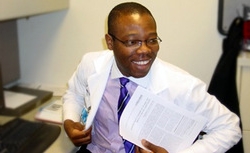
Northwestern University researchers are flipping the model of transporting Western healthcare technology – often impractical and expensive – to the developing world. Instead, they will begin a series of projects working with universities in Nigeria to develop the country’s first biomedical engineering departments and neurocognitive AIDS research center.
The goal is to initiate training programs that will help the universities conduct research, invent medical devices, and manufacture and market those devices. The African inventions could even flow back to the West and ultimately benefit patients in the United States because they will be simpler and less costly.
“We are going to teach the medical schools to train biomedical engineers and medical doctors to develop testing tools like a rapid-HIV infant test rather than buy expensive equipment from manufacturers here and in Europe,” said Robert Murphy, MD, director of the Center for Global Health and the John P. Phair Professor of Infectious Diseases.
Murphy is directing the project alongside Matthew Glucksberg, director of the Center for Innovation in Global Health Technologies at the Robert R. McCormick School of Engineering and Applied Science, and Kara Palamountain, executive director of Northwestern’s Global Health Initiative at the J.L. Kellogg School of Management. It is the first National Institutes of Health (NIH) grant to span the engineering, medical, and business schools.
HIV Testing
Western HIV diagnostic technologies are typically expensive and done in centralized labs with highly automated machines. But Africa doesn’t have the laboratory or transportation infrastructure of the West, so results may get lost or patients may not return to the clinic, Murphy said.
“You want to diagnose them in the clinic so you can begin treatment immediately,” Glucksberg added.
The Northwestern team will be working to develop a new curriculum with the University of Ibadan and Lagos University in Nigeria with whom the University already has faculty and student exchange programs.
“Right now, medical professionals use technology that has been developed for the West in situations where neither the disease nor the environment may be the same,” Glucksberg said. “Nigeria has good engineers and clinicians. They need to get together and develop biomedical engineering programs so they can address their own needs.”

Focus on Neurocognitive Effects
Babafemi Taiwo, MBBS, associate professor of medicine-infectious diseases, is also embarking on a project to help Nigerian scientists stabilize the nation’s healthcare approach.
“We now have the ability to treat HIV so well that patients can live long and healthy lives,” said Taiwo, a member of the Center for Global Health. “However, almost half of these individuals continue to display evidence of impaired cognitive function, despite the disease being held in check.”
The issue is one Taiwo will train Nigerian scientists to explore. The five-year project will work to determine whether the virus itself, or the drugs administered to contain it, are the root cause of neurocognitive deficits.
“What we know is that these disorders worsen quality of life and drive poor adherence to antiretroviral treatment (ART) – the drugs used to suppress HIV – thereby increasing the risk of morbidity, mortality, and HIV spread,” said Taiwo, the academic director of the Northwestern University AIDS International Training and Research Program. “Right now, in Nigeria, there is no evidence base to inform clinical practice, limiting progress in the field.”
In coordination with Kevin Robertson, PhD, at the University of North Carolina School of Medicine, Taiwo will look to transform the University of Ibadan, where he attended medical school, into the epicenter of neuroAIDS research in Africa.
The pair has already identified individuals who will be coming to the United States for up to a year of training at Northwestern University Feinberg School of Medicine, Harvard, and the University of Buffalo.
“They will work in neuropharmacology, neurobiology, neurocognitive testing, neurobiostatistcs, and some will do the Master of Clinical Science program at Feinberg,” Taiwo said. “Through these projects, we are going to help develop all of these different skillsets and then bring them together in the hopes of answering some of the big questions in Africa.”
Together, the projects represent part of the more than $20 million in funding recently awarded by the Fogarty International Center of the NIH.
Roger Anderson and Marl Paul contributed to this report.






